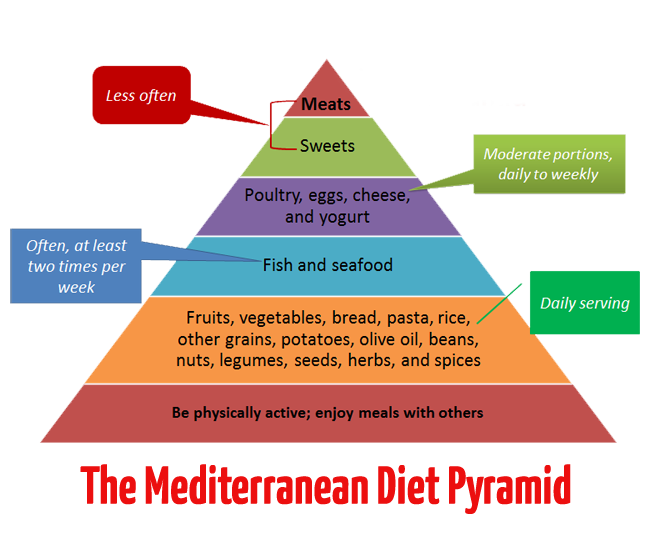Savor a Mediterranean Diet!
May 17, 2016

Source: Medical-Reference.net
America is blessed in so many ways, but our Western diet shouldn’t be considered one of them.
For the most part, our diet contains refined grains, sweets, desserts, sugared drinks, trans-fats and fried foods.While most of us really crave and love these foods,they help fuel killer diseases. A much better option for all of us is the Mediterranean diet.
This diet, developed around a European lifestyle, was first written about by Ancel Keys in 1945 when he was stationed in Salerno, Italy. Dr. Keys figured out that the population was unusually healthy and decided it was because of the diet in countries like Italy and Greece.Even though he published his findings on the Mediterranean diet in the 1940s, it took nearly 50 years for the concept to gain popularity and traction in the 1990s.
Clinical research of more than 1.5 million healthy adults has proven that following a Mediterranean diet was associated with a reduced risk of cardiovascular mortality as well as overall mortality. More importantly, it also helps prevent heart attacks, strokes, type 2 diabetes and premature death. If you follow this diet, you may benefit from improved weight loss, better control of blood glucose (sugar) levels and reduced risk of depression.
Additional benefits of this diet are numerous and impressive! The Mediterranean diet also is associated with a reduced incidence of cancer, as well as Parkinson’s and Alzheimer’s disease. Females who follow this diet but supplemented with extra-virgin olive oil and mixed nuts may have a reduced risk of breast cancer. Other studies discovered that this diet helps protect your bones, stave off macular degeneration, lower the risk of hip fractures, and help fend off memory loss.
These findings have led most, if not all, major scientific organizations to encourage healthy adults to adapt a style of eating like that of the Mediterranean diet for prevention of major chronic illnesses.
What is the Mediterranean Diet?
Possibly the world’s healthiest, the Mediterranean diet is abundant in vegetables, fruits, whole grains, legumes and olive oil. Also included is fish and poultry – lean sources of protein – over red meat, which contains more saturated fat. Red wine is consumed regularly but in moderate amounts.
It is critical to know that a Mediterranean diet is not really a diet per se but rather a healthier way of eating. It is a lifestyle that includes regular physical activity, sharing meals with other people and enjoying life.
You should base your diet on these healthy, unprocessed Mediterranean foods:
- Veggies (tomatoes, broccoli, kale, spinach, onions, cauliflower, carrots, Brussels sprouts, cucumbers, etc.)
- Fruits (apples, bananas, oranges, pears, strawberries, grapes, dates, figs, melons, peaches and all the others; use fresh fruit as dessert)
- Nuts and seeds (almonds, walnuts, Macadamia nuts, hazelnuts, cashews, sunflower seeds, pumpkin seeds and more)
- Legumes (beans, peas, lentils, peanuts, chickpeas, etc.)
- Whole grains (whole oats, brown rice, rye, barley, corn, buckwheat, whole wheat, whole grain bread and pasta).
- Poultry (chicken, duck, turkey, and more; only small amounts of red meat each week)
- Fish and seafood (salmon, sardines, trout, tuna, shrimp, oysters, clams, crab, and mussels, etc. However, be cognizant that certain kinds of fish are known to have high concentrations of mercury)
- Eggs (eat no more than about four eggs each week such as chicken, quail and duck)
- Dairy (cheese, yogurt, Greek yogurt)
- Tubers (potatoes, sweet potatoes, turnips, yams, etc.
- Herbs and spices (garlic, basil, mint, rosemary, sage, nutmeg, cinnamon, pepper, etc.)
- Healthy fats (extra virgin olive oil, olives, avocados and avocado oil)
Since we just listed the foods that you should eat, here are the unhealthy foods and ingredients that you should avoid:
- Added sugar: Soda, candies, ice cream, table sugar and many others
- Refined grains: White bread, pasta made with refined wheat, etc.
- Trans fats: Found in margarine and various processed foods
- Refined oils: Soybean oil, cottonseed oil and others
- Processed meat: Processed sausages, hot dogs, etc.
- Highly processed foods: Everything labelled “low-fat”or “diet”or looks like it was made in a factory.
Helpful tips on how to adopt a Mediterranean diet:
- Switch from butter and margarine to healthy oils as often as possible. Use olive oil as your primary fat for cooking and baking. Other plant-based oils, such as canola or walnut oil, are also rich in heart-healthy monounsaturated and beneficial omega-3 fatty acids.
- Switch out most of your red meat and get your protein from skinless chicken and turkey, fish, beans, nuts and other plants. By replacing red meat, you’ll lower your saturated-fat intake.
- Don’t skimp on veggies! Most people don’t get enough. Aim for 3-8 servings a day and big green salads are a great way to include several vegetable servings at once.
- Don’t pass up whole-grain bread, pasta, rice and other grains! Look for the term “whole” or “whole grain” on the food package and in the ingredient list – it should be listed as the first ingredient. Other foods to consider are quinoa, barley, oatmeal, and even popcorn (but skip the butter).
- Snack on seeds, nuts and low-fat cheese or dairy instead of processed snack foods. Look to almonds, walnuts or sunflower seeds in place of chips, cookies or other processed snack foods which are packed with sugars, saturated fat and trans-fats. Calcium-rich low-fat cheese or low-fat and nonfat plain yogurt with fresh fruit are other healthy and portable snacks.
- Select fruit for dessert which is a good source of fiber, vitamin C and antioxidants. If you need it to be sweeter, add a little sugar.
- If you drink, moderate your consumption to no more than a glass or two with a meal.
- Go fishing! Eat fish once or twice a week. Fresh or water-packed tuna, salmon, trout, or herring are good choices. Avoid fried fish unless it is sautéed in a small amount of canola oil.
- Choose low-fat dairy, and limit higher fat dairy products such as whole or 2 percent milk, cheese and ice cream. Switch to skim milk, fat-free yogurt and low fat cheese.
The Mediterranean diet is a delicious and healthy way to eat with incredible benefits. But remember that a key component to this lifestyle is exercise. Many who switch to this way of eating say they’ll never eat any other way!
Bon appetite!




